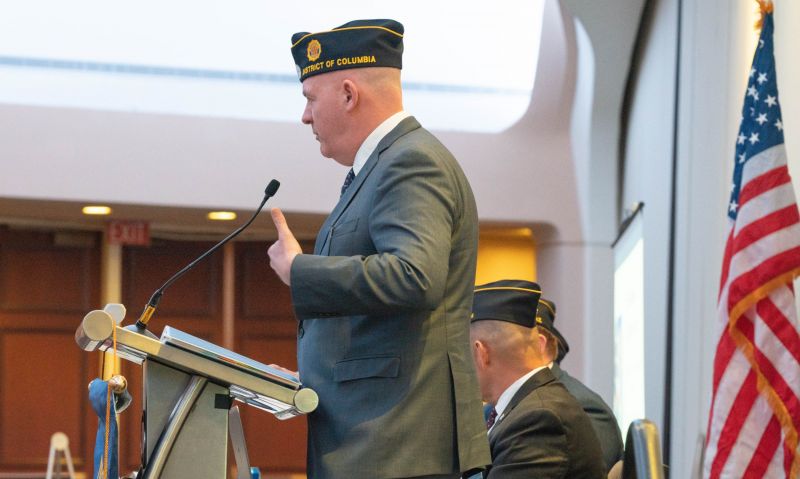
National Security Commission hears update on a confluence of threats related to Russia’s invasion, China’s meddling, food insecurity and more.
As America confronts threats from China and Russia, as well as the aftermath of the withdrawal from Afghanistan, a former assistant Secretary of State shared his worldview with The American Legion National Security Commission on Feb. 27.
“I stand before you at yet another difficult time for America’s partnerships,” said R. Clarke Cooper, who served as assistant Secretary of State for political and military affairs from 2019 to 2021. “A time spanning the current and past administrations, a time since the end of the Cold War, a multipolar world, when many nations look at partnering with America on matters of defense and security not as an imperative, but one as several options.”
Cooper, who served in the U.S. Army and the Reserves, addressed the commission during its meeting at the Legion’s 63rd Washington Conference. “Partners and allies still expect us to lead. The U.S. must match actions with words.”
He covered additional national security topics like food insecurity, the rise of totalitarian governments, ongoing terrorism threats and more. Noting the first anniversary of Russia’s invasion of Ukraine, Cooper pointed out how it disrupted the global economy, shook up energy markets and allowed China to further impose itself on Taiwan.
“It is no wonder why many of my peers assess the world is on the verge of global conflagration on a scale not yet witnessed by humankind,” said Cooper, a member of American Legion Post 1 in Washington, D.C. “No one, even America’s adversaries, claims to want a global conflict, and yet, conditions for peace are seemingly less favorable today.”
The withdrawal from Afghanistan is concerning to allies, he said.
“Unfortunately, our relationships with allies and partners was greatly stress-tested by the debacle of the U.S. withdrawal in Kabul in August in 2021,” he said. “Now, treaty allies and partners are reassessing their bilateral security relationships with the United States.”
That has led Middle East partners to seek understanding of the U.S. policy in the region. “They want an improved relationship with the U.S. but they also share concerns about the lack of a declared U.S. strategy for the region and confusion over incongruous strategic planning for the globally impactful Middle East.”
Still, Cooper said, the U.S. has a long history of being a world leader that still resonates.
“These are challenging times,” he noted. “We are naïve if we believe countries around the world, including longtime partners, have no choice but to partner with America. It is true, if we scratch the surface of the offers laid out by our adversaries we find failed systems, flawed training and false bargains. It is important that we Americans make the case for why partnering with America is not just the better choice but indeed the best choice.”
American Legion Auxiliary President Vickie Koutz briefed commission members on an initiative that aligned with one of their missions. Koutz referenced the POW-MIA remembrance flag.
“Those who don’t understand what it means, think that everyone has returned home and is buried in a cemetery,” she said. “But that is not the case. Our members have been raising awareness for our nation’s prisoners of war and missing in action. (Troops’) remains from previous wars are still being found to this day. And those families are getting the closure they so desperately deserve.”
National Security Chairman Matthew Shuman of the Department of Arizona underscored how being on a commission illustrates how members serve other veterans.
“Ultimately, you being here means that you care,” he noted. “You care about this organization and all that we do for our fellow brother and sister veterans.”
In closing, Shuman talked about the importance of spreading the message beyond this week in the nation’s capital.
“I enjoy a challenge,” he said. “Let me give you a challenge, if you don’t mind. I challenge you to go home and share that message. I challenge you, as you go to Capitol Hill to meet with your lawmakers, take what you learned today and use it to better the organization. As you go home, ask for time at your department convention to share what you learned here today, tomorrow and on Wednesday. If you don’t share what you learned from this, that’s not serving the organization.”
- Washington Conference

